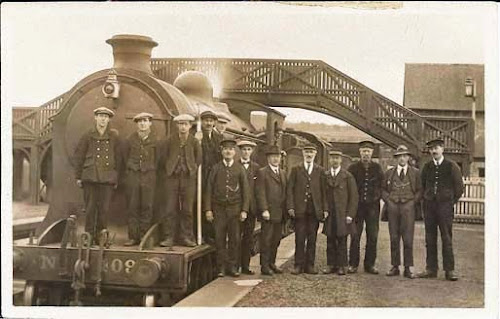This week’s Sepia Saturday prompt photograph show two burly men working with very heavy chains. So take a look here at more men involved in heavy work.
Men working with the heavy machinery in the textile mill in Earlston in the Scottish Borders. From the mid -19th century through to 1969, the mill was the chief employer in the village and the mainstay of the local economy.
Road workmen in Greece taking a break - my husband encountered this group in 1971 and when he took a photograph, they wanted some money!
Highs and Lows of Work
Steeplejacks climbing the mill chimney at Simpson and Fairbairn Textile Mill in Earlston, Scottish Borders - early 1900s.

Arthur Smith, my cousin's father emerging from a manhole during his work as a linesman for the General Post Office.
Getting Abou
Tommy Roger, a coracle maker, born c. 1845, Ironbridge, Shropshire -
My father John Weston
grew up in Broseley on the other side of the river from Ironbridge, and
this photograph was found in the collection of his older brother Fred.
You
might be wondering, where is the mode of transport is here? Well, it
is on the back of Thomas Rogers, A coracle is a small, lightweight boat with a loosely woven frame traditionally covered in animal hide, but in more recent times calico, canvas and coated with a substance such as bitumen. When
the Iron Bridge was opened in 1779 locals objected to paying the tolls,
so they used their coracles to cross the river instead.
Tommy Roger was
well known as a poacher and the local newspaper reported his
appearance in court on poaching charges. He also helped to build the
new police cells and court room in Ironbridge in 1862 - only to be one
of the first people to use them!
Staff and visitors at Earlston Railway Station, c.1920. The Berwickshire Railway reached Earlston in 1863, but following sevee flodding in 1948, the line only contineud with freight traffic not passengers and was finally closed in 1965.
Many family historians will have Carters among their ancestors and for the majority of people, horse and cart was the only way to get around or to transport goods. But it was not without its risks and local newspapers regularly featured reports of bad accidents - cartwheels coming loose, overladen carts overturning etc.
One such report was on the death on November 27, 1860 of Earlston grocer, Alexander McWilliam who was making his rounds, selling to customers and collecting produce from farmers, when he slipped and fell from his car. He sustained head injuries and died at home. He was just 36 years old and left two young children and a heavily pregnant wife.
Farm work had its own risks too:
Piling up heavy haystacks on a cart in Earlston.
Grappling with sheep in sheep shearing in Earlston
Back to travelling by water - my husband's ancestors were mariners sailing out of South Shields to face the hazards of the North Sea.
My husband's great great grandfather John Moffet, master mariner - a burly man in this Napoleonic pose.
"The Shields Gazette" on
abounds with headlines and reports on disasters at sea, storms and
gales; the lifeboat responses. and the ensuing work of the Mariners'
benevolent societies in helping families in distress. A typical examples is given below:
Finally - two family photographs - in the 1930s and 1940s my grandfather William Danson of Poulton-le-Fylde, Lancashire was a general labourer at th ICI (Imperial Chemical Industries) Works at nearby Thornton,. Here with a group of workmen - with Grandad the seated figure in the front.
Some 50 years later, my brother, William's grandson, was working in the oil industry.
**********
Sources:
Sepia Saturday gives bloggers an opportunity to share
their family history and memories through photographs

Click HERE to see other bloggers at work on this prompt photo.
**********
Postscript: I am having a great deal of trouble adjusting to this new Blogger Interface, in terms of font choice, standard sizing of photographs, spacing etc. plus the major factor - I cannot seem to access Print Preview. I obviously dislike changes!!














Wonderful collection of hard working men...good match to the SS prompt. Me too for the new Blogger, and I'm using the old blogger interface as long as it's there!
ReplyDeleteThank you for your kind comment, Barbara. It was good, to get your remark on the new Blogger. I knew if I left the change to the last minute I would be even more in a panic. Good luck with it!
DeleteA neat composition of hard labor diversity interspersed with family photos! The photo of the Greek laborers who then wanted money is a new one on me! I guess one needs to be careful taking pictures when one is in a foreign country? Wow. :)
ReplyDeleteA great post to honor hard work of all kinds.
ReplyDeleteI'm fascinated by occupational photos of the 19th and early 20th century. The pictures combine a history of trade, toil, and place with the personal faces of men and women who knew the value of hard work. Your photo of the coracle maker tells so more than any written description. Now I can imagine that river filled with bobbing coracles like a flotilla of ducks.
ReplyDeleteTerrific selection of working fellows from different eras! Well done.
ReplyDelete